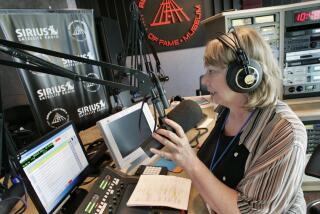Radio and Revenue
- Share via
Having lived 10 years as a radio station program director and announcer, I read with interest Goldstein’s “Between Rock and a Hard Place.” I was saddened to see the industry slip a few more feet into a radio wasteland.
Artists have long lamented the effect the business has had in discouraging airplay for anything but well-established talent.
I also refer to Linda Ronstadt’s criticism of current trends in radio (“A Conversation With Linda Ronstadt,” Oct. 29). Her comments seem to reflect the feelings of most artists, established or not, concerning radio’s insecurities about trying any new group or sound.
Now, KROQ’s Reeb wants to play with the big boys by joining the L.A. radio outlets that juggle formats in pursuing the all-mighty half-point in the Arbitron ratings. Does he think a “safer” format will bring listeners? If so, why not convert KROQ to the safest--a country format?
My years in “the biz” have taught me several lessons:
Go back to basics and target the audience you wish to reach based on what segment of listeners needs to be served. Secondly, tell the consultants to take a hike. And, finally, worry about the audience , not the dollar.
Tightly formatted and “formula” radio doesn’t work. It’s boring. Which brings me to a final point. Let the jocks have fun, keeping their “talk sets” to 30 seconds or less. The fun and energy (and the occasional “renegade,” to use Reeb’s description of fired deejay Dusty Street) make it interesting and hold the audience through the “spot set.” That fun and energy is absorbed as audience enjoyment. (Simple formula: Audience enjoyment = $$$.)
As far as KROQ is concerned, if it ain’t broke, don’t fix it--expand it, going back to the basics, circa 1978-85. KROQ was fun then--before it became a “business.”
DUSTY BAKER
Glendale
More to Read
The biggest entertainment stories
Get our big stories about Hollywood, film, television, music, arts, culture and more right in your inbox as soon as they publish.
You may occasionally receive promotional content from the Los Angeles Times.










